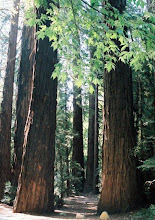Just the other day, I came out of the church into swirl of fallen leaves being blown by the wind in the sunshine. Out of the corner of my eye, I noticed one up near my shoulder. I was going to ignore it and go when I stopped and thought, "how did this one leaf get up by my shoulder?" Before I could finish that thought, the blacks and golds fluttered by my face. It was a Monarch butterfly.
It was beautiful. I stood absolutely still and watched it in wonder until it flew off. I reflected later that this experience was all the more special because of how rare it has been this year. I haven't seen many Monarchs.
In chaos theory, the butterfly effect describes how a tiny change in one place in the system can effect great changes overall. This year perhaps especially, the Monarch butterfly is an example of that effect.
Monarchs have been endangered for years now by the use of pesticides, the change in farming practices where fields are even larger and hedges and brush along fence lines are disappearing, and along with those practices, milk weed pod, the weed that the butterflies depend on for food are disappearing. This year, these delicate beauties are also being hit hard by the severe drought on the southern Great Plains. To survive, Monarchs must migrate south to Mexico beginning in August. Like all migrating species, they need food and water along the way to survive the rigorous trip. Some scientists are worried that conditions this year may be the tipping point for the species.
In New York City and in cities around the country, people are protesting. It's called Occupy Wall Street. The media has been having a hard time covering it because they can't find a concise reason or meaning. One common sign reads, 'We are the 99'; meaning the ninety-nine percent that are not extremely wealthy. They are protesting everything from the banks and those that were bailed out and are now making record profits while "regular" people have lost homes, jobs, and taken losses in their retirement funds and abilities.
These two phenomena intersect at a very central biblical concept: stewardship. Now this is not "stewardship lite" in the way that contemporary church talk has reduced stewardship to a once-yearly focus on how much money you need to give to "the church" or "to God". The central biblical concept of stewardship is about how humans are to relate with each other and to the whole of creation that God has put into our hands. The core of that concept is care for the poor, the weak, and nature itself.
According to the Old Testament, the Monarch would have habitat and the poor would have food; "you shall not reap to the very edges of your fields... you shall not strip your vineyard bare... you shall leave them for the poor" (Leviticus 19:9-10). There is also the concept of the year of Jubilee when liberty is proclaimed for all people and for the land. At its base is an understanding that the land belongs not to people but to God and therefore, we cannot claim ownership in perpetuity nor are people to be dealt with unfairly or a few to retain dominion over others.
The biblical concept of stewardship calls us to mindfulness that we are the caretakers not the owners and that God's wish is for mercy and to look after all people. It is in this faith question that the life of the butterflies and the protestors can meet. What does God have to say about corporate greed, about a time when the richer get wildly richer and more and more people fall into poverty, and about the devastation of rain forests, butterflies, and the polar ice caps?
The biblical concept of stewardship does impact monetary issues, but only because it seeks to impact everything from energy-saving lightbulbs, to recycling, to our menus, and whom we invite to the table to eat of the harvested bounty. It's not a question of what do we do with "our" stuff but of recognizing and then living the truth that all of this and us included, belong to God. Read Isaiah 58:6-9
Subscribe to:
Post Comments (Atom)


No comments:
Post a Comment